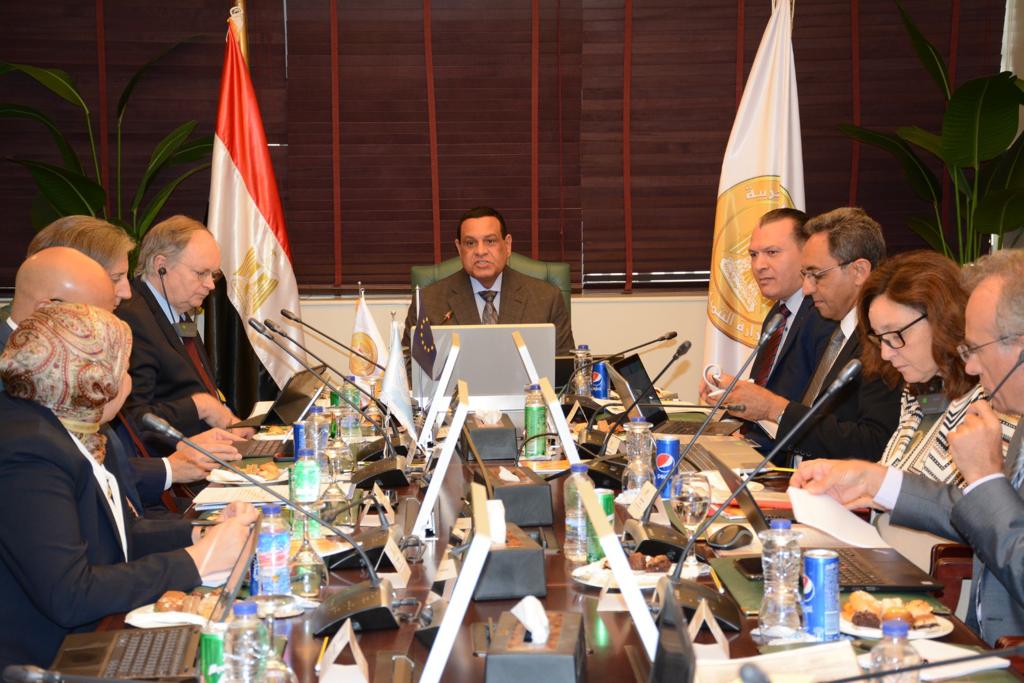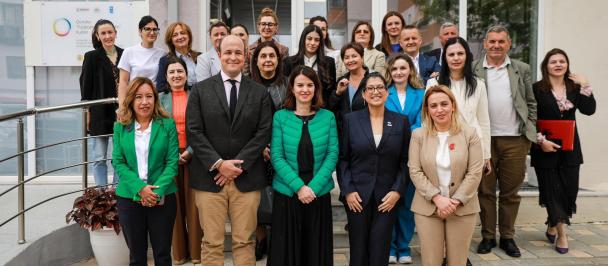Ministry of Local Development, the European Union, and United Nations Development Programme Convene to Review Progress in Technical Support in the fields Institutional Development, Promoting Integrated Local Development and Decentralization
May 31, 2023

Cairo, Tuesday, 30 May 2023: The Minister of Local Development, His Excellency Major General Hisham Amna, hosted the second board meeting for the joint project entitled‘Supporting the Ministry of Local Development in Integrated Local Development and Decentralization with Special Emphasis on Upper Egypt’. This project stands as a remarkable partnership between the Ministry of Local Development (MoLD), the European Union (EU), and the United Nations Development Programme (UNDP).
The meeting was attended by the Director of International Cooperation for Development Department at the Ministry of Foreign Affairs, His Excellency Ambassador Yasser Abed, Head of the European Union Delegation to Egypt, His Excellency Ambassador Christian Berger, and UNDP Resident Representative in Egypt, Mr. Alessandro Fracassetti.
The support of the EU, amounting to €7 million, towards developing government’s strategy on decentralization, local administration reform and enhancement of public service delivery to Egyptian citizens, underscores the objective of this partnership. This partnership aims to support the Ministry’s mission of creating a modernized and decentralized local administration system in multiple Upper Egypt governorates as a pilot. This process includes creating integrated local development and governorate strategic plans that adhere to good governance, by promoting excellence in public services delivery systems, and local economic development.
The meeting reaffirmed the project's strategic support to MoLD in its efforts towards the Presidential Initiative Hayah Kareema (Decent Life) via mandated reforms in local administration that ensure enduring impact and sustainability of the inclusive improvements of services and infrastructure, as well as by promoting key interventions in the local economic development infrastructure that lead to the provision of sustainable employment opportunities for youth and women in rural districts and poor villages. Notably, the project targets the governorates of Beni Sueif, Fayoum, Luxor and Aswan.
During the meeting, an all-encompassing review of the project's performance to date was undertaken, specifically focusing on the progress made in supporting the Ministry of Local Development on strategic planning for the ministry as well as institutional and human resources development, along with the work achieved in the respective governorates. Through dedicated advocacy efforts by the project team, activities were successfully initiated in the four pilot governorates, introducing planned interventions and implementation arrangements. Potential local economic development projects were initially identified in the governorates, such as a center for the development of village-level processing of aromatic and medicinal plants in BeniSueif. Remarkably, the project provided significant support in orienting and supporting local planning committees and the socio-economic councils in these pilot governorates, emphasizing the importance of participatory planning.
As decentralization and local administration reform remain paramount on the agenda of the Government of Egypt, the project has been entrusted with the role of technical secretariat of the inter-ministerial committee for local administration reform for decentralization, to be formed by the Prime Minister. In this capacity, the project assisted MoLD in formulating the committee’s mandates and setting the national agenda of working on implementation of a national decentralization strategy. The meeting also explored the project's path forward, particularly regarding institutional development efforts in the four pilot governorates and capacity building for both MoLD and the local administration.
The project’s objectives strongly align with the constitutional obligation, the ministry’s current strategic orientation and the local administration reform agenda including optimizing resource utilization and supporting sustainable job creation at the local level.
H.E. Major General Amna, the Minister of Local Development affirmed the state's interest in decentralization, highlighting the ministry’s previous efforts and initiatives regarding decentralization. In his talk, he accentuated the elements of decentralization that are currently taking place including the empowerment of governors to develop their investment plans and development projects. In addition, governorates actively participate with central ministries and agencies in developing local development systems and providing support to the concerned authorities to respond promptly to citizen needs.
The H.E Minister of Local Development expressed: "We are interested in training programs and qualifying human resources for the Ministry and the governorates, not only in the four pilot governorates of the project, but in all governorates of Egypt”. He accentuated the importance of training programs not only to the four pilot governorates of the project but to all governorates of Egypt.
During the meeting, Dr. Khaled Abdel Halim, the Project Director, presented the conceptualframework and the theory of change of the project, the work plan for the year 2023 and the expected outputs of the project this year. In his presentation, he reviewed the activities that the project has implemented during 2022 regarding domains of local development policies, legislation, institutional development, capacity building for the Ministry and local administration employees, and developing local development systems. The Project Director shed light on the budget spending and the delivery rate of the project, the challenges facing the implementation of activities during the implementation period, and the way forward for the project. He concluded his presentation to study the proposal to extend the timeframe of the project for one and half years without additional funding, so that activities and the budget can be planned from now over a period of four years instead of two and a half.
Head of the European Union Delegation to Egypt Ambassador Christian Berger underlined the European Union's full commitment to support Egypt in developing an integrated policy strategy for local development through decentralization and local administration reform. "The reform will maximize the impact of the assistance offered on the target communities' livelihoods as well as allow civil society to contribute more efficiently to Egypt's sustainable and inclusive development" Berger added.
UNDP Resident Representative in Egypt, Mr. Alessandro Fracassetti, emphasized UNDP's commitment to supporting sustainable development in Egypt, with a particular focus on supporting SDG localization and the country's poorest villages and regions through initiatives like "Hayah Kareema" (Decent Life). He stated, "Decentralization, effective local administration, and rural development are essential pillars for sustainable development, and the enhancement of public service delivery to Egyptian citizens. Our long-standing partnership with the Ministry of Local Development and the European Union has been and continues to be instrumental”.
At the end of the meeting, the attendees, including representatives of the United Nations Development Program and the European Union, agreed on the importance of the project for the Ministry in supporting it carry out its assigned roles in its mandates. The attendees agreed on the importance of training programs not only to the four pilot governorates of the project but to all governorates of Egypt.

 Locations
Locations


